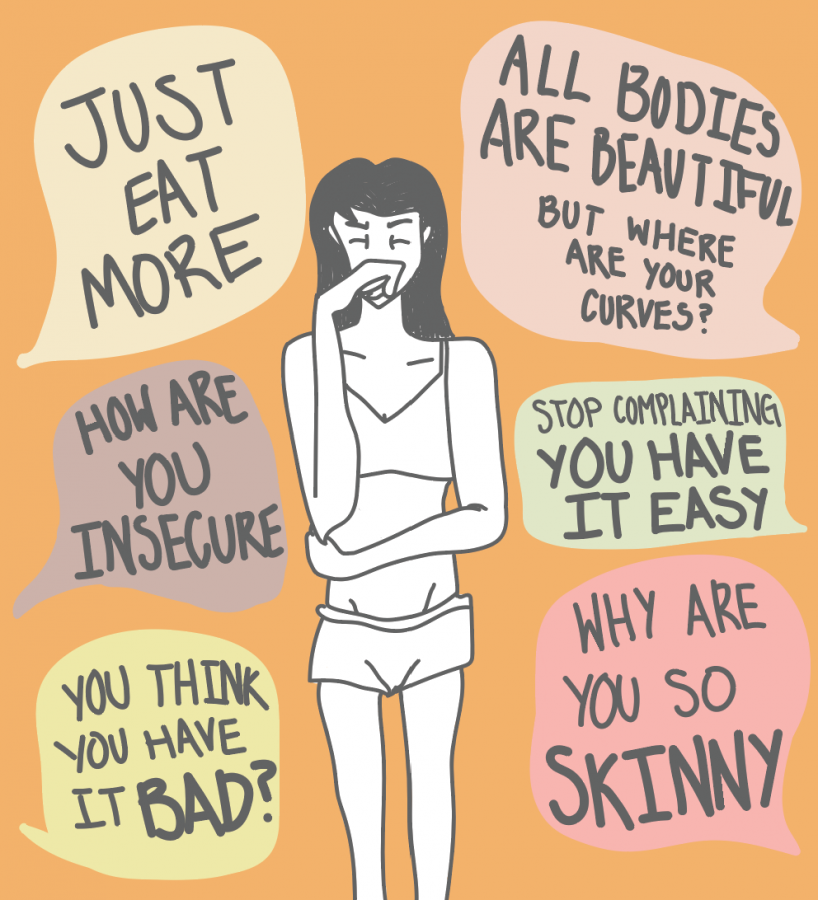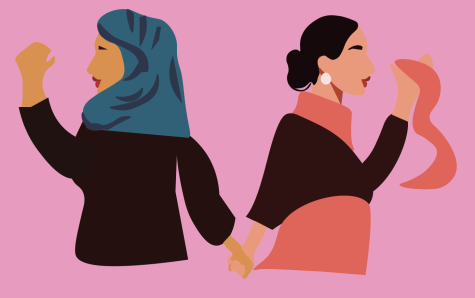No Perfect Body
Body shaming has become common in the age of social media and globalization, but why are offensive comments towards the skinnier side of the spectrum considered invalid?
In an era of social media and globalization, body-shaming has made its way into mainstream media at an alarming rate. Through modern ideals of what the “perfect” body and health size looks like, the public has used this as a scapegoat to openly criticize certain body types, mainly those who are overweight. However, the media fails to accept that derogatory comments towards those who are skinnier are equally as offensive to the person receiving the comment, whether it affects them mentally or physically.
Throughout the years, society has spewed belittling comments towards thinner people due to the fact that they are not the main targets of conventional body shaming. Body shaming, according to Merriam-Webster dictionary, is “the act or practice of subjecting someone to criticism or mockery for supposed bodily faults or imperfections.” No matter how it is formatted, or who it is targeted towards, body shaming is openly criticizing someone based on their physique. Though it is less common to find these comments aimed at skinny people, bringing attention to someone’s shape or size is an immediate cause for insecurity within the person, skinny or fat.
A perfect example of how reverse shaming — or just plain body shaming — can affect both sides of the weight spectrum is the Binge Eating Disorder (BED). According to the National Institute of Mental Health, BED is characterized by recurrent binge eating episodes during which a person feels a loss of control and marked distress over their eating. People suffering with BED tend to feel like their eating behavior is out of control, yet can find no way to stop their perpetual eating phases. Being told to “eat more” is a key factor in skinnier individuals feeling like they must ingest large amounts of food in shorter periods of time in order to uphold society’s subjective everchanging “perfect body” stereotype.
“Pointing out something about someone’s physical appearance is never okay,” freshman Ruben Cruz said. “You never know what insecurities people can have, so bringing them up could make the person feel even worse.”
In addition, society has perpetually developed the ideal that someone’s health can be determined by merely looking at their physical appearance, but this could not be further from the truth. When thinking of someone who is skinny, people tend to assume that he or she is leading a healthy lifestyle and is in a good mental state, so pointing out their flaws would not be as harmful as pointing out the flaws of someone who is heavier. The mental state of someone cannot be determined by body shape or size, so assuming that someone is “healthy” enough to hear insults is offensive and should not be considered a normality.
However, it must be acknowledged that the shaming of people at a heavier weight has been far more common in modern media for generations, so the humiliation of those who are at a lesser weight tends to go unnoticed. Meghan Trainor’s hit song “All About that Bass” went viral for supposedly promoting body positivity, mainly among females. Yet, a deeper delve into the song’s lyrics shows how it is promoting satisfaction with the body people are born in, just as long as they conform to societal standards of what the ideal body looks like. The song perpetuates that being overweight is perfectly fine as long as an individual has curves, but it is never okay to be underweight since it is not what “boys like.” Song lyrics are just one example of how celebrities and media use their platforms to spread the dogma of being at ease with shaming skinny people.
“People make skinny shaming more casual because they might mean it as a compliment,” sophomore Ariadna Torras said. “I’ve been told various times that I don’t eat enough even though I eat and take care of my body.”
There is no perfect body size, shape or build. It is time to stop gaslighting offensive comments towards skinnier people and bring an end to body-shaming towards all weights. Every single human being is made differently and criticizing everyone because of their appearance will only lead to irreversible societal struggles and health problems in upcoming years. If individuals continue to allow openly offensive and derogatory comments towards skinnier people to happen, body-shaming will never really be gone.
Your donation will support the student journalists of Coral Gables Senior High School. Your contribution will help us cover our annual website hosting costs.














